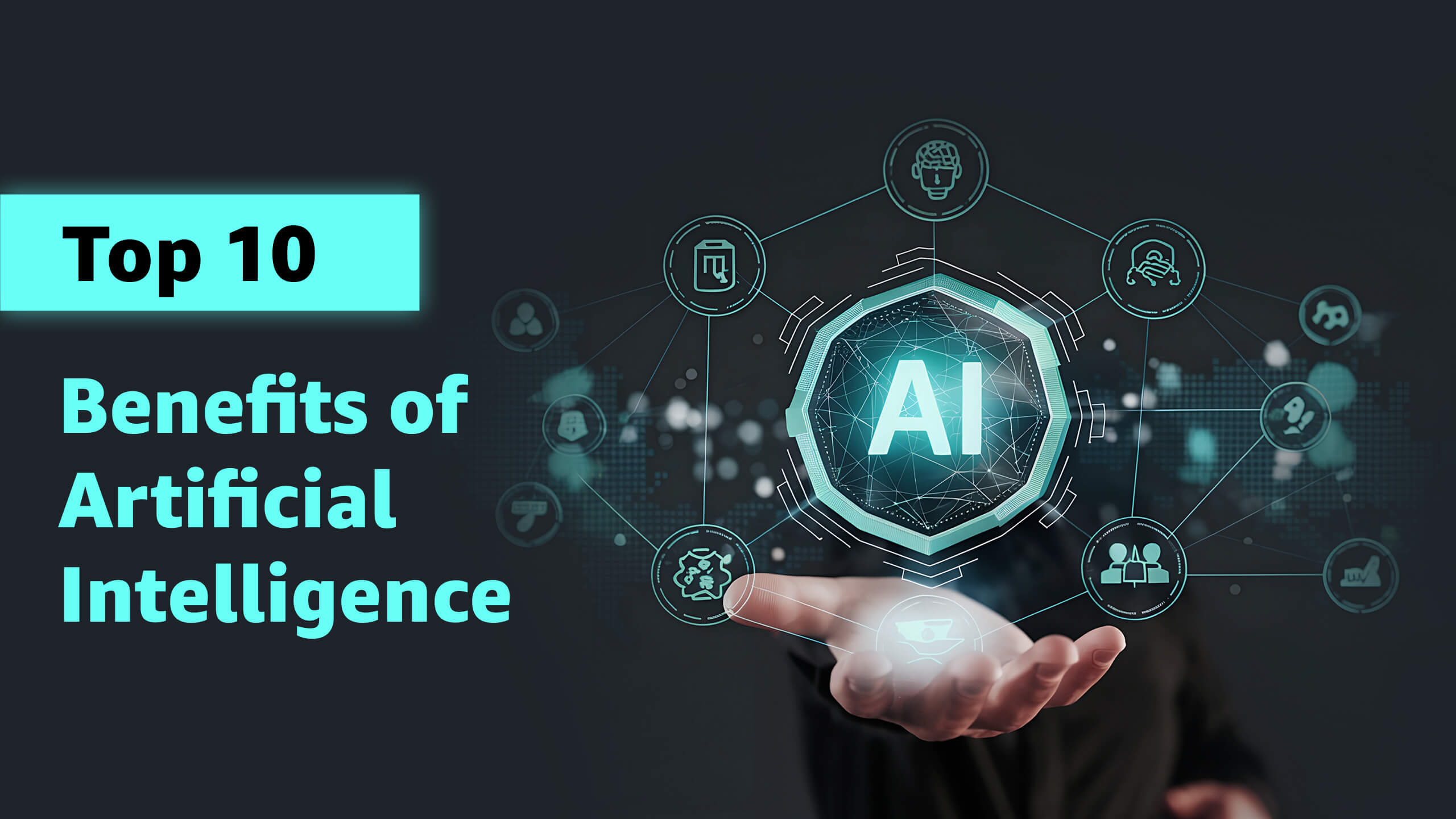Out of every ten people, you will have at least eight who know about the revolution brought by artificial intelligence and its sub-technological domains. Their knowledge depth might not match that of a tech-savvy person who has either created an AI project or has an academic background in the same. However, the fact that AI has created a strong and undeniable foothold in multifarious markets proves that modern technology spreads further beyond IT. From AI-based tools like ChatGPT to AI-powered voice assistant devices like Alexa, it has penetrated multiple sectors and fostered innovation in numerous ways. What’s more, artificial intelligence when combined with natural language processing, machine learning, big data, and other such concepts can surpass human capabilities.
Despite being the turning tide of the technology sector, a significant group is still in the dark regarding the benefits of artificial intelligence. Either they are yet to acknowledge the true and unaltered power of AI or they haven’t yet discovered its benefits, both theoretically and practically. As a result, they quickly fall for the rumors or myths revolving around the entire concept, like AI replacing human workers and more. So, it’s imperative for everyone to understand the full scope of artificial intelligence, which is why we have illustrated ten major benefits of AI and its sub-technologies.
1. Automation of Repetitive Tasks
In industries like manufacturing, fabrication, document handling, and many more, manual work processes introduce huge delays in the deliverables and production line. This is where artificial intelligence enters the picture, allowing developers to implement automated routines and workflows within the existing infrastructure or technical architecture. For example, a supply chain business can use AI-powered ERP software to automatically track inventory and synchronize product levels between the backend and the storefront.
Similarly, AI-based banking software can automatically fetch customer forms and create accounts with the accurate details mentioned or automate the invoice and bill generation process. Integration of AI workflows can reduce dependencies on human employees and speed up the work process for efficiency enhancement and delivery improvement. Additionally, the elimination of manual intervention will automatically mitigate human errors and increase process accuracy and precision.
2. Smarter Decision-Making Abilities
Artificial intelligence can also be used to increase the decision-making and analytical capabilities of businesses and enterprises. Coupled with predictive analysis, natural language processing, and deep learning, AI models can fetch huge data volumes, like search histories, customer chats, and past orders for accurate and precise analysis. Businesses can further leverage these reports to make crucial decisions, modify their action strategies, predict market trends, and perform several other critical actions smartly and in a better way.
3. Complex Problem Solving
One of the major use cases of artificial intelligence is enhancing the problem-solving abilities of a system or an application. It is often used in conjunction with deep learning and natural language processing algorithms to analyze hidden patterns in user behavior and actions. This can further help the AI models to make complicated decisions, like detecting fraudulent transactions on payment gateways, forecasting weather patterns, and even diagnosing medical conditions by analyzing the symptoms of the patients. One prime example of this use case is PayPal’s AI fraud detection system which analyzes fraudulent payment patterns and accordingly validates the initiated transactions based on the customer data.
4. Personalization
Most brands strive hard to provide the best user experience to their customers by implementing multifarious strategies. From gathering survey details to referencing past search histories, there are several ways in which businesses plan to provide a personalized buying journey to their users, especially in the e-commerce, retail, and wholesale industries. However, the rate of success is not worth mentioning due to the striking lack of a system that could accurately analyze data and improve the decision-making process.
That’s why businesses have integrated AI techniques and advanced machine learning algorithms to deduce the search intent of different users based on historical datasets. It allows the system to offer a hyper-personalized experience to the users through strategies like product recommendations, custom buying journeys, and on-the-go virtual assistance. As a result, the process of brand interaction with the target audience can be improved significantly, allowing businesses to establish a strong foothold in the market.
5. Enhanced Cybersecurity
One of the major areas where artificial intelligence has brought a revolutionary transformation is cybersecurity. Combining machine learning algorithms like deep learning and natural language processing, cybersecurity professionals can integrate smart and intelligent threat detection layers in any application or system exposed to external threats. These layers will automatically detect any deviation in the regular user behavior pattern and immediately notify about a potential fraud or cybersecurity threat. Additionally, the AI models can be further used to run thorough audit checks on the pre-implemented security layers to accurately detect any anomaly or open back door risking the security and privacy of the concerned application or infrastructure.
6. Accurate Demand Forecasting
In the supply chain industry, most businesses struggle with forecasting any sudden change in demand or the projected order volumes based on a specific season. Although they have huge data volumes, there is no proper technology or software that could evaluate them and provide details about upcoming orders or product demand. This further creates problems in maintaining enough stock levels or implementing proper strategies to handle bulk orders.
However, with the integration of AI algorithms and a strong neural network, businesses can leverage their intelligence and advanced analytical properties for accurate and precise demand forecasting. For example, the model will fetch past order histories and market trends to understand the product types that could be in huge demand for the upcoming season. It will allow business to procure the concerned products and maintain enough stocks to streamline supply and demand cycle.
7. Better Cost Reduction
There are numerous ways in which artificial intelligence is coupled with state-of-the-art machine learning algorithms for cost reduction and upfront investment management. For example, implementing an AI assistant to resolve customer grievances or guide them through the buying process will eliminate the dependency on human operators, thereby reducing employee recruitment and retention costs. Similarly, AI models can also help in accurate budget forecasting, ensuring businesses and enterprises won’t have to go overboard with their funds and can utilize the same in the best possible manner. In other words, AI models can easily help reduce operational expenses and appropriate fund allocation or utilization for different business scenarios.
8. Streamlined Communication
Communication siloes exist for numerous reasons, like language barriers, lack of transparency between different teams, and many more. To overcome these hassles and ensure streamlined communication between different groups or teams within an organization, several businesses and companies have leveraged AI models with enhanced capabilities. For example, an AI-based language translator system can reduce communication barriers between groups speaking different native lingua franca and facilitate collaboration and cooperation. Similarly, AI-integrated modules can help different teams within an organization to collaborate in real time, thanks to enhanced data transparency and visibility.
9. Better Disaster Management
Another area where artificial intelligence has been used extensively is in disaster management through accurate and precise weather forecasting. Meteorological departments can leverage the AI models to detect any anomaly or undocumented behavior or pattern in weather and climate reports and live datasets. As a result, they can easily forecast any upcoming flood, cyclone, and other types of natural disasters.
Apart from this, AI models can also be used for simulations to determine the areas that will be impacted due to weather abnormalities and generate proper warning systems or routines. This can help in better disaster management and save more lives without disrupting regular activities. On top of everything, artificial intelligence can also be leveraged for predicting and analyzing weather data based on a hyper-localized spectrum.
10. Enhanced Market Intelligence
Last but not least, artificial intelligence can be used to get detailed and accurate customer insights and understand the market in an advanced manner. For example, businesses can improve and customize their marketing strategies based on segmented audiences through AI models. When amalgamated with deep learning and natural language processing, AI models will create accurate and precise segments of the target audience based on their search histories, product preferences, and order histories. As a result, curating appropriate marketing and promotional campaigns will become easier for several brands across multifarious industries.
Conclusion
In this article, we have illustrated the top 10 benefits of artificial intelligence in today’s world. Based on these, it’s evident how this concept can enhance the decision-making, problem-solving, analytical, and predictive abilities of a business or a system. Hence, all you need to do is partner up with a reputed and credible AI development company that can create and implement a strong, reliable, and highly functional AI software or system with your existing technical infrastructure.
Also, ensure your partner can provide hyper-personalized and tailored AI solutions to cater to your specific technical and business requirements using different ML and AI practices prevalent in the market. Only then you will be able to steer around the bottlenecks and improve your business deliverables and process performance by significant levels.





